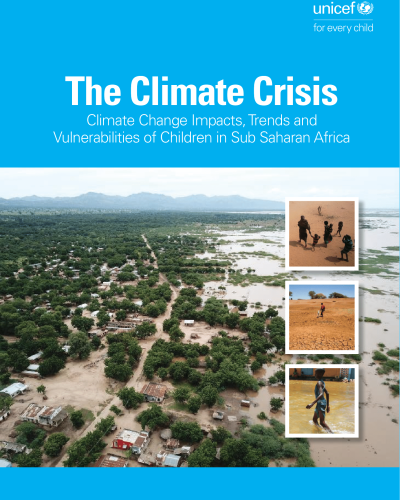The Climate Crisis Report: Climate Change Impacts, Trends and Vulnerabilities of Children in Sub Saharan Africa

COVID-19 is a seemingly relentless test of the world’s ability to respond to an unprecedented crisis. Yet while global efforts confront the pandemic, we must not forget that the world is facing an even more ominous challenge: the climate crisis.
Before COVID-19 hit the continent, African children were already suffering from the effects of longer and more intense droughts, repeated oods and shifting seasons. Whilst all efforts are focused on how to respond to the pandemic and address its socio-economic impacts, climate change remains a long-term threat unlike any we have faced. In fact, it is a threat that continues to disproportionately harm children, young people and their communities across Africa. These climate impacts are causing forced displacement, disruption of schooling and increased child labour, and contributing to increased violence as availability and access to natural resources become scarce. They are directly affecting children’s health due to deteriorating sanitation and compromised access to clean water, as boreholes dry up, and forcing children to fetch water in ever-more remote locations under severe exposure to heat.
Although there is no evidence of a direct correlation between climate change and COVID-19, the former may affect the pandemic response as it undermines environmental determinants of health—such as clean air, water and sanitation, and nutritious food—and puts further stress on health systems.
With disruptions of essential basic services, including school closures, and far-reaching socio-economic impacts, the COVID-19 crisis and its management has wrought havoc across Africa. As we move to the recovery phase, we cannot go back to business as usual, but must “build back better.” COVID-19 provides us with an opportunity to reimagine a world where children and youth are protected from various shocks and stresses including the impacts of climate change, while ensuring access to basic services such as education, health, water and sanitation, nutrition, and protection. The focus must be on at-scale investment in processes, practices and systems that are sustainable, risk-informed and inclusive, and increase our resilience and ability to respond to future crises. The message could not be starker: Africa’s children depend on it.
This report identifes existing and future climatic vulnerabilities and sets out what is needed to equip communities, systems and children to cope with climate crises. Investment in climate and disaster-resilient water, sanitation and hygiene (WASH) systems; green and safe schools for resilient learning; climate-smart and disaster-resilient health services that have a minimal environmental footprint; climate-responsive social protection mechanisms; and climate-smart food systems and diets are all vital. The report also covers how UNICEF can best work with key and transformative partners to tackle climate crises with innovation, scientific evidence and creativity.
The COVID 19 pandemic has revealed the challenges and wide-ranging consequences of managing major crises. More frequent and intensive climate related disasters may exacerbate service disruptions and call for enhanced efforts for local, grid- and off-grid energy solutions to maintain services in health, education, nutrition and WASH and sustain efforts for children to thrive and survive. Additionally, investments in new renewable energy and related skills building would increase the employability of youth, make them stronger and empower them to lead change towards more resilient and sustainable societies.






